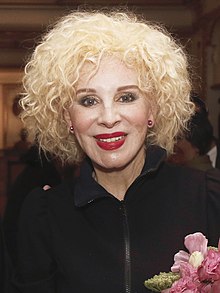
María Cristina Lancelotti, better known by her stage name Valeria Lynch, is an Argentine singer and actress.

Paloma Cecilia San Basilio Martínez, known as Paloma San Basilio, is a Spanish singer. She is a recipient of the Latin Grammy Lifetime Achievement Award for her valuable contributions to Latin music. She has sold over 16 million records throughout her career, with styles that range from melodic songs to pop. She often appeared in various musicals such as the Spanish-language premiere production of Andrew Lloyd Webber's Evita in Madrid. Some other musical theater works include Man of La Mancha, My Fair Lady, Victor/Victoria, and Sunset Boulevard.
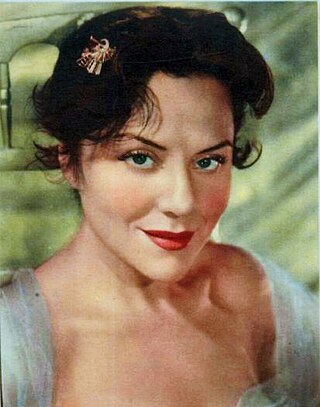
Amelia Bence was an Argentine film actress and one of the divas of the Golden Age of Argentine Cinema (1940–1960).

Mecha Ortiz was a classic Argentine actress who appeared in films between 1937 and 1981, during the Golden Age of Argentine Cinema. At the 1944 Argentine Film Critics Association Awards, Ortiz won the Silver Condor Award for Best Actress for her performance in Safo, historia de una pasión (1943), and won it again in 1946 for her performance in El canto del cisne (1945). She was known as the Argentine Greta Garbo and for playing mysterious characters, who suffered by past misfortunes in love, mental disorders, or forbidden love. Safo, historia de una pasión was the first erotic Argentine film, though there was no nudity. She also played in the first film in which a woman struck a man and the first film with a lesbian romance. In 1981, she was awarded the Grand Prize for actresses from the National Endowment for the Arts.

Laura Ana "Tita" Merello was an Argentine film actress, tango dancer and singer of the Golden Age of Argentine Cinema (1940–1960). In her six decades in Argentine entertainment, at the time of her death, she had filmed over thirty movies, premiered twenty plays, had nine television appearances, completed three radio series and had had countless appearances in print media. She was one of the singers who emerged in the 1920s along with Azucena Maizani, Libertad Lamarque, Ada Falcón, and Rosita Quiroga, who created the female voices of tango. She was primarily remembered for the songs "Se dice de mí" and "La milonga y yo".

Zulema Esther González Borbón, better known as Zully Moreno, was an Argentine film actress of the Golden Age of Argentine Cinema (1940–1960). She appeared in more than 70 movies, earning best actress awards from the Argentine Academy of Motion Picture Arts and Sciences and the Spanish Cinema Writers Circle.

Alita Blanca Barchigia, better known as Alita Román, was an Argentine film actress of the Golden Age of Argentine Cinema (1940–1960).

Nelly Láinez was an Argentine comedic actress, best known for her performances in a string of unusually titled Argentine comedic films and television shows such as Vampires Prefer Fatties in 1974.
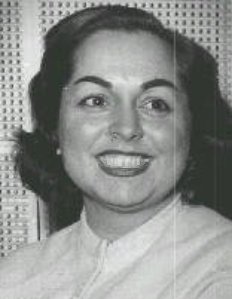
Nélida Dodó López Valverde known professionally as Nelly Beltrán was an Argentine actress. She appeared on the radio from the age of 10 and in 85 theatrical performances, 48 films and 3 dozen television shows between 1953 and 1996. She won a Martín Fierro Award as Best Comic Actress for her television work on La hermana San Sulpicio; participated in the film Pajarito Gómez which won the Best Youth Film award at the 15th Berlin International Film Festival; won a Konex Foundation Award; and was honored by the Argentina Actors Association in 2004 for her career contributions.

The Argentina Bicentennial was a series of ceremonies, festivals, and observances celebrated on May 25, 2010, and throughout the year. They commemorated the 200th anniversary of the May Revolution, a sequence of historical events that led to the Viceroy Baltasar Hidalgo de Cisneros being ousted from office and replaced with the Primera Junta, the first national government.

Teresa Adelina Sellarés, best known as Teresa Parodi, is an Argentine singer and songwriter. She held the inaugural post of Minister of Culture of Argentina from May 6, 2014, to December 9, 2015. She was a deputy to the Mercosur Parliament (Parlasur) representing the nationwide district of Argentina from December 10, 2015, to October 6, 2016. She was elected on the Front for Victory ticket in the 2015 election.

Mónica Villa is an Argentine actress of stage, screen, and TV, as well as a researcher and educator. She earned a Best Actress award for her role as "Susana" in cult classic "Esperando la Carroza at the 1985 Festival de Cine Iberoamericano, in Huelva, Spain. She won an ACE Golden award for best leading actress in the 2002 comedy "Ojos traidores", a 2004 Premios Trinidad Guevara for best Actress of a Repertoire Company, a Premios Carlos de Oro for her 2011 performance as best lead actress in the theater production "Jardín De Otoño", and in 2015 a Premios Estrella de Mar for Best Female Performance in a Repertoire Company for "La Nona". In addition, she has been nominated for a Best Actress in a TV Special for the 2003 Premios Martín Fierro, making her acting work recognized in all three major media.

Olinda Bozán was an Argentine film actress and comedian of the Golden Age of Argentine Cinema (1940–1960). Born into a circus family, she acted on the vaudeville circuit, and performed in silent and sound movies. She was trained by the Podestá brothers, one of whom she married, who have one of the most prestigious Argentine acting awards named for them. Bozán appeared in 75 films and was considered one of the best comic actors of Argentine cinema in the 20th century.
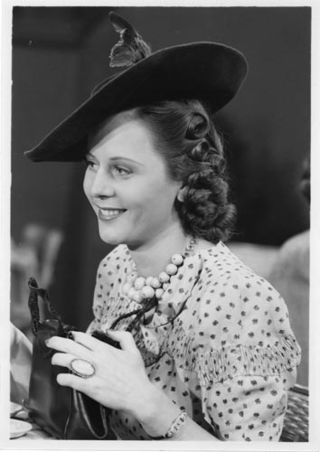
Aída Luz was an Argentine actress who primarily worked during the Golden Age of Argentine Cinema, performing on both stage and in films. She won multiple awards for her performances including the Martín Fierro Awards, the ACE de Oro, the Premios Estrella de Mar and the Golden Condor from the Argentine Film Critics Association.

María Elena Lucena Arcuri was an Argentine film actress of the Golden Age of Argentine Cinema (1940–60). She began her career in radio in the 1930s and reached her greatest success with the role of "Chimbela", which was later depicted in film, theater and television. Her extensive film career includes approximately 50 films, including notable performances in Chimbela (1939) and Una noche cualquiera (1951). During the 1940s, she participated in films with comedians like Pepe Arias, Pepe Iglesias "El Zorro", Niní Gambier, Mirtha Legrand and Carlos Estrada. Her most acclaimed film work occurred in Elvira Fernández, vendedora de tienda (1942) by Manuel Romero, Cinco besos by Luis Saslavsky and La Rubia Mireya for which she received the 1948 Best Comedy Actress Award from the Argentine Film Critics Association.

Zulma Aurora Faiad is an Argentine vedette and actress.

Daniel Cherniavsky is an Argentine writer, filmmaker director of cinema, and producer of theatre and culture.
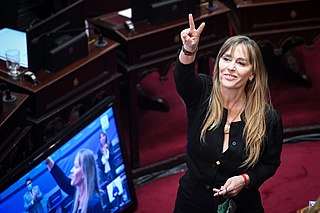
Juliana Di Tullio is an Argentine psychologist and politician. A member of the Justicialist Party, Di Tullio served three terms as National Deputy representing Buenos Aires Province, from 2005 to 2017. From 2013 to 2015, during the presidency of Cristina Fernández de Kirchner, Di Tullio was president of the Front for Victory parliamentary bloc in the lower chamber of the National Congress. She also served as a member of the Mercosur Parliament, and in the board of directors of the Banco Provincia. Since 2021, she has been a National Senator for Buenos Aires Province.

Heavy Tango is a studio album by Argentine singer and actress Nacha Guevara, released in 1991 by BMG and RCA Records. Recorded between April and August 1991 in Buenos Aires, it is her only musical work published during the 1990s. As its title indicates, the album tries to be a fusion of tango with heavy metal, inspired by glam metal band Bon Jovi's work of the late 1980s. Guevara co-produced and led the project with her partner at the time, Miguel Ronsini, a relationship that scandalized the public opinion of the time, as she was much older than him. The album features Tita Merello on her last recording appearance, a hip hop version of the famous tango "Se dice de mí". During this era, the singer adopted a look very reminiscent of Cher's. The Heavy Tango Tour toured the Argentine cities of Buenos Aires, Córdoba and Rosario. In addition to Argentina, Guevara performed in Málaga, at the Gran Teatro of Huelva, and at the Seville Expo '92. While in Spain, the singer also made several appearances on Jesús Quintero's television program.

Fátima Flórez is an Argentine actress and comedian. She was the girlfriend of Javier Milei, president of Argentina, from 2023 to 2024.
